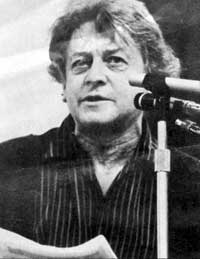More languages
More actions
Cathal Goulding | |
|---|---|
 | |
| Native name | Cathal Ó Goillín |
| Born | January 2, 1923 Dublin, Ireland |
| Died | December 26, 1998 Dublin, Ireland |
| Allegiance | Anti-Treaty Irish Republican Army (1939-1969) Official Irish Republican Army (1969-1976) |
| Rank | Chief of Staff of the Anti-Treaty Irish Republican Army (1962-1969) Chief of Staff of the Official Irish Republican Army (1969-1976) |
| Battles/wars | Campaign of Resistance to British Occupation the Troubles |
Cathal Goulding was an Irish Republican and Marxist-Leninist revolutionary leader in Ireland. He was Chief of Staff of the Anti-Treaty Irish Republican Army from 1962 to the split in that organization in 1969. After that he was Chief of Staff of the Official Irish Republican Army until 1976.[1]
Early Life[edit | edit source]
Cathal Goulding was born on January 2, 1923 in Dublin, Ireland to Charles Goulding and Bridget Costello. He came from an Irish Republican family, with his grandfather being involved with the Invincibles in the 1800s and his father and uncle fighting in the Easter Rising. His parents were both imprisoned during the Irish Civil War, and after the war ended his father was blacklisted for his Anti-Treaty and Socialist views.[1]
He joined Fianna Éireann, the youth wing of the Anti-Treaty IRA, at 14 years old in 1937. In 1939 he joined the Anti-Treaty IRA.[1]
Anti-Treaty IRA[edit | edit source]
He was imprisoned soon after joining for 12 months due to his organizing in 1946. He ran a training camp in Wicklow in the 1940s and raided the armoury of the officers' training corps in Essex. During the escape from the raid he and 2 others were arrested. Goulding was imprisoned for six years.[1]
He was elected to the Anti-Treaty Army Council in 1959, serving as Quartermaster General and was elected to the lead position of the IRA, the Chief of Staff, in 1962. He began to lead to move of the IRA and the Republican movement broadly leftward, as well as against the traditional Republican party of abstentionism. He also increased IRA collaboration with labor unions and other leftist groups.[1]
The tensions stemming from Goulding's electoralism and percived inaction in relation to the Troubles grew over the 1960s, with many IRA and Sinn Féin, particularly in Kerry and Belfast, being expelled or openly opposing the central leadership. He proposed that the Republican movement participate in parliamentary politics, not just in the collaborator Republic of Ireland, but also in the Northern Ireland Parliament and the United Kingdom Parliament. This led to a split in the Anti-Treaty IRA in December 1969 and a parallel split in Anti-Treaty Sinn Féin in January 1970.[1][2]
After this split Goulding became involved with the electoralist and Marxist-Leninist Official movement.[1]
Official Movement[edit | edit source]
He became Chief of Staff of the Official Irish Republican Army after the split. It became involved in attacks against British soldiers, especially after the introduction of internment in August 1971 and the Bloody Sunday massacre on January 30, 1972.[1]
The response to Bloody Sunday included the bombing of Aldershot Barracks, the headquarters of the Parachute Regime, which was responsible for Bloody Sunday, the attempted assassination of the Minister of State for Home Affairs John Taylor, and the killing of William Best, a Catholic British Army soldier. These actions caused controversy, and combined with the murder of Official IRA figure Joe McCann by British troops, Goulding and others who never fully supported armed struggle called for a ceasefire in 1972. Despite the ceasefire the Official IRA engaged in sporadic armed actions, including many against breakaway Republican group the Irish National Liberation Army.[3]
Goulding left the position of Chief of Staff of the Official IRA in 1976. Seán Garland succeeded him.[1]
He remained involved in Official Sinn Féin, which became Sinn Féin - The Workers Party in 1977 and Workers Party in 1982. He opposed the revisionism of Mikhail Gorbachev and opposed a Social-Democratic splinter group from the party called Democratic Left in 1992.[1]
He died on December 26, 1998 in Dublin at the age of 75.[1]
Personal Life[edit | edit source]
He married Patty Germaine in 1950. They had one son, Cathal Óg Goulding. He later had relationships with Beatrice Behan, with whom he had Paudge Behan, and Moira Woods, who already had six children and with whom he had one son and one daughter.[1]
He was a longtime friend of Socialist poet and playwright Brendan Behan.[1]
